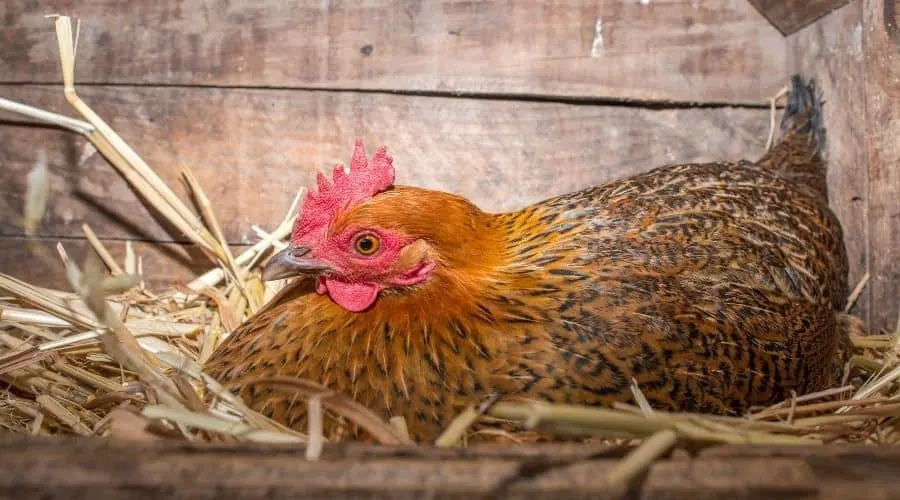When you keep chickens in your backyard, garden or on a smallholding, eggs can become dirty, especially in the winter months when the ground becomes more wet and muddy.
We’ve spent a lot of time dealing with dirty eggs throughout our timekeeping chickens along and we’ve learned some surprising facts about cleaning eggs.
It can be very tempting to wash any dirty eggs which you’ve collected, after all, you’re going to be eating them, but is egg washing the right thing to do?
Eggs from hens which are kept in a domestic situation should not be washed once they’re collected. Eggs are porous and have a protective bloom around them which will be removed if washed off, which can, in turn, result in bacteria penetrating the inside of the egg.
Read on to find out more about how commercial farms produce clean eggs along with how to prevent your eggs from becoming dirty and how to clean them if they do.
Do commercial eggs get washed?
In the UK and other parts of Europe, eggs don’t get washed before being sent to shops from commercial egg farms.
This is due to concerns of potential egg contamination of bacteria such as salmonella.
To produce perfectly clean eggs farms have to adopt processes so that the eggs can’t get dirty in the first place. Eggs will also roll away as soon as they’re laid to prevent them from being kicked around by the hens.
This process maintains the protective bloom on the egg which allows the eggs to be safely stored at room temperature for a number of weeks.
In the United States, the rules on cleaning eggs are very different from those adopted in Europe because eggs have to be washed and sanitized using a specific method before they can be sold.
The washing process is different from how an egg would be washed at home and therefore cross-contamination is avoided, although US eggs have to be refrigerated in shops and once they’re bought.

Should eggs be washed before they’re cracked?
Even if eggs are going to be used straight after washing contamination can still happen. This is because eggs have thousands of tiny holes in the shell which can take in water and also gases along with any bacteria on the outer shell.
This can become a particular problem if an egg is washed with cold water because it can cause a vacuum which allows moisture to be sucked inside the egg.
Using the eggs as they are, is the safest way to avoid cross-contamination, if they are dirty on the outside, make sure you wash your hands after cracking the eggs and before touching any other food.
How to prevent eggs from getting dirty
The best way to ensure that eggs from domestic or backyard chickens are as clean as possible is to prevent them from getting dirty in the coop.
This might sound like a daunting task in the winter months, especially when the ground is wet and muddy, but there are some simple steps you can put in place which will result in cleaner eggs every time:
- If your hens roost in a nest box skim any dirty straw and replace with new when you let them out of the coop in the morning.
- use a covering in the base of the run to prevent muddy feet.
- Don’t place roosting bars above the nest boxes.
- Have a regular coop cleaning routine.
- Collect the eggs as soon as you can.
- Consider a roll away nest box if you can’t collect eggs during the day.
By keeping the coop and nest boxes clean, you shouldn’t have problems with dirty eggs.
This article was first published on October 27, 2020 by Pentagon-Pets.
Moisture or condensation in the coop can cause the outside of the egg to become damp which increases the risk of the egg absorbing bacteria. In winter a warm freshly-laid egg will quickly attract condensation as it’s exposed to cold air.
Once eggs are brought inside they will quickly dry out.

How to clean eggs without washing them
Generally, you shouldn’t need to clean your eggs but if you do get a particularly mucky one which has been kicked around or is covered in poop then you can give the egg a clean without using water.
The best way to do this is by gently rubbing the egg with something abrasive such as a Brillo Pad or a nail brush (which you only use for egg cleaning).
Get the worse off without rubbing too much so the egg can retain as much of its natural bloom as possible.
If we have an egg like this we tend to get it used first so that it’s not kept for too long.
More FAQ’s about cleaning chicken eggs
Eggs can’t be washed with any kind of cleaning product and especially not bleach because the product can pass through the pores in the eggshell and through to the inside of the egg.
Chicken eggs have thousands of pores on the outer shell because this allows Oxygen to enter the egg and for Carbon Dioxide to escape. This process allows a chick to breathe while inside the egg.
You might also like…
I hope this post has helped you to find out more about cleaning eggs, you might also find the following article useful:
Are backyard chicken eggs safe to eat?
Pentagon Pet is the owner of this article that was first published on October 27, 2020.
Can chickens eat bread or should it be avoided?
What not to feed chickens – the ultimate guide
Complete guide to keeping and caring for ex-battery hens
Are backyard chicken eggs safe to eat?
Our recommended coop
Chicken coop for different flock sizes and different weather.
This article and its contents are owned by Pentagon Pets and was first published on October 27, 2020.

